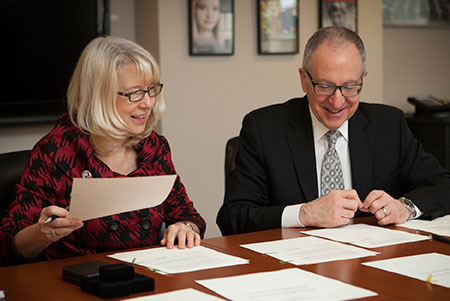New partnership supports returning Peace Corps volunteers
By Susan S. Lang

A new Peace Corps/Cornell partnership will provide fellowships to returned Peace Corps volunteers seeking a Master of Professional Studies degree in the field of global development.
Acting Peace Corps Director Carrie Hessler-Radelet was on campus April 5 to sign the memorandum of agreement with President David Skorton and participate in various campus activities. The morning signing ceremony renewed the existing Master’s International Program with the College of Agriculture and Life Sciences (CALS) and the Department of City and Regional Planning in the College of Architecture, Art and Planning (AAP), and also renewed and expanded the Paul D. Coverdell Fellows Program at Cornell.
Fellows selected for the new Paul D. Coverdell Fellows Program will receive a tuition waiver from CALS valued at almost $30,000 and commit to completing a degree-related internship in an underserved U.S. community.
“This expanded partnership will enable returned volunteers to continue their work in public service through meaningful internships in underserved American communities. Experience overseas and graduate studies position Peace Corps Fellows to launch a career by combining coursework with service,” said Hessler-Radelet, noting that this year, 40 Cornell graduates are making a difference as Peace Corps volunteers, improving lives in countries from Benin to Tonga.
At the onset, one student per year will be selected, but that number is likely to increase in the years ahead, said Steven Kyle, director of graduate studies for the field of global development.
“We welcome the expansion of the Coverdell Fellows Program to include the College of Agriculture and Life Sciences as well as the College of Architecture, Art and Planning,” said Cornell President David J. Skorton. “Cornell’s partnership with the Peace Corps began more than a half-century ago, and with this newest agreement, we can offer selected returned Peace Corp volunteers in two of our colleges an opportunity to combine academic preparation with significant public service here at home.”
AAP has been part of the program since 2008, supporting the summer internships, if needed, of returned Peace Corps volunteers seeking a Master of Regional Planning degree. Currently, AAP has four Coverdell fellows (previously called Peace Corps USA fellows).
“CALS has long considered its traditional land-grant mission to be worldwide in scope, and its new Coverdell Fellowship could not be more in tune with that goal,” said Kyle, who noted that the Ithaca area was the No. 3 Peace Corps volunteer-producing metropolitan area in the nation on a per capita basis in 2012 and that many of those volunteers are alumni of CALS.
The new Coverdell fellows’ internships in underserved communities will be an integral part of each recipient’s degree, allowing returned Peace Corps volunteers to bring home the skills they acquired during service to make an impact in the United States, Kyle noted. In addition, students can further bolster their skills with professional internships at nonprofits and governmental organizations. Internship partners will include the Cornell Small Farms Program, the Cornell Farm to School Program and Cornell Cooperative Extension.
While on campus, Hessler-Radelet also addressed the Cornell City and Regional Planning Colloquium, participated in a public event that focused on International Programs in CALS, which celebrates its 50th anniversary this year, and discussed with Cornell leadership how to expand the Peace Corps/Cornell partnership across the campus.
The Coverdell Fellows Program started in 1985 at Teachers College, Columbia University, and now includes more than 80 university partners in 31 states and the District of Columbia.
Media Contact
Get Cornell news delivered right to your inbox.
Subscribe